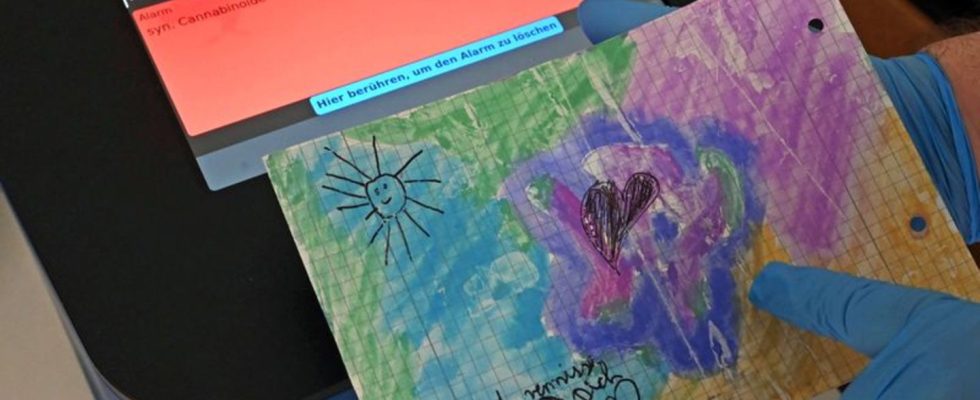Justice
Drug scanners in prisons are becoming more widespread
Using a drug scanner, it was determined that the paper in the picture was soaked in synthetic cannabinoid. photo
© Uli Deck/dpa
Drug scanners are intended to prevent synthetic drugs from being smuggled into prisons. The device developed in Rhineland-Palatinate is not only setting a precedent nationwide.
The drug scanner can detect new psychoactive substances (NPS) that are sprinkled on paper and smuggled into the prisons in letters. These synthetic drugs now make up around 80 percent of the drugs in a prison like the Wittlich JVA, said Patzak. Unlike classic drugs such as cocaine or cannabis, they are invisible and odorless. The detector, which was launched in a pilot project in Wittlich in the summer of 2018, detects these substances: JVA employees take samples with a test strip, they then place the strips into the device in order to receive an analysis after a few seconds.
A database at the Rhineland-Palatinate State Criminal Police Office (LKA) that lists the substances is constantly updated. Around 100 substances are currently recorded, mostly synthetic cannabinoids. “We make the database available to all federal states.” Apart from North Rhine-Westphalia and Bremen, all countries are now taking part. And also cooperation partners abroad: The Netherlands has also been part of the project with four prisons since 2023.
There are already concrete discussions about cooperation with Luxembourg. Other European countries have inquired. The drug scanner database developed in prison with the LKA is “a real export hit,” said the Ministry of Justice.
Lots of hits already
The scanner has already had many hits in Rhineland-Palatinate and Saarland: By the end of 2023, out of a total of 2,700 processes and 11,250 evidence items measured in the prisons, there had been 664 cases in which drugs were detected, said Patzak. Of these, the Wittlich JVA accounted for around 1,500 incidents and 257 hits.
The designer drugs are extremely dangerous, said Patzak. “We want to prevent the prisoners from collapsing.” Most of the time, consumption units would be cut out in the form of small squares on checked paper and smoked. The consumer often does not know how the substance works or how much has been applied. “There is a high risk of overdose. Luckily we haven’t had a drug-related death yet.”
But the fight against drugs is also important to protect employees, said the head of the largest prison in Rhineland-Palatinate with almost 500 inmates. “This stuff makes people highly aggressive, and prisoners freak out completely unexpectedly from one second to the next.”

